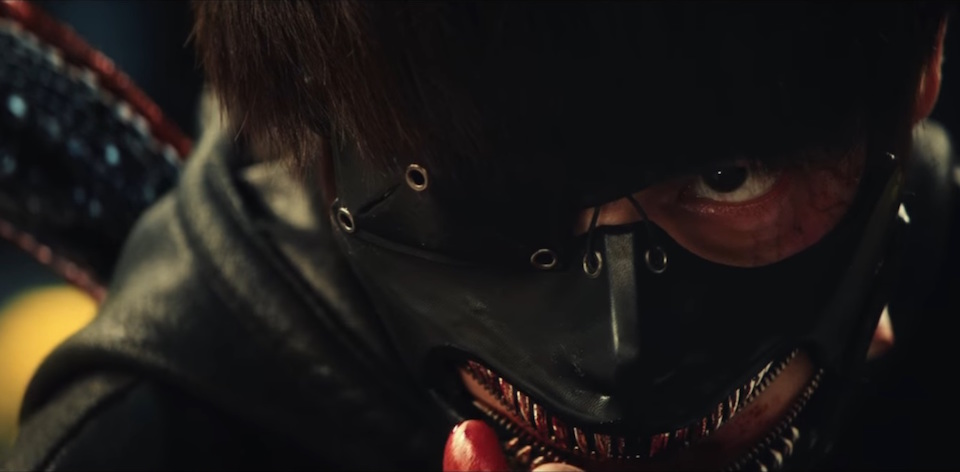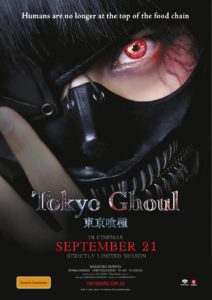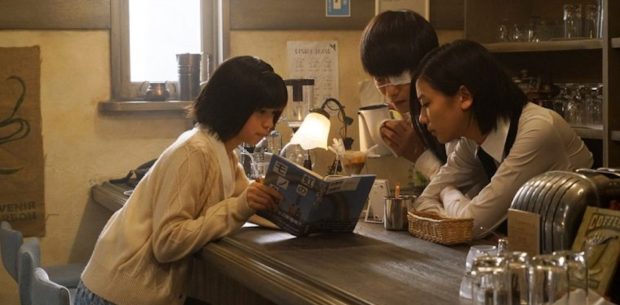The journey from successful manga to anime and live action film is almost an obligatory rite of passage in Japanese pop culture. Yet TOKYO GHOUL (東京喰種), based on Sui Ishida’s manga, feels tailor made for the big screen, fitting in nicely with a wave of vampire sub-culture properties across the globe.
The bookish university student Ken Kaneki (Masataka Kubota) has his life turned upside down when he is attacked by a ghoul. He soon becomes a half ghoul, struggling with the hungry new side of his persona. Working against him is the Commission of Counter Ghoul (CCG), and investigator Kureo Mado (Yo Oizumi).
On one level, TOKYO GHOUL is caught between tipping its hat to the legions of fans who are already familiar with the material, and the need to cater to an entirely fresh audience for a new medium. Director Kentarô Hagiwara’s (Anniversary) film often errs on the side of the latter, in a largely exposition-driven script. As Kaneki is discovering his powers early on, for example, a TV news report playing in the background lays out the rules for the vampiric ghouls.
Yet Hagiwara is also in a hurry to trot out some of the important touchstones for fans, rattling through encounters with the CCG and throwing in terms like “quinque” with little to know explanation. For those of us not as au fait with the source material, it may come across as somewhat scattershot or disjointed.
Keeping an internal cohesion is Hagiwara’s commitment to style, adopting distinctive looks for the various story threads. There’s a stylistic contrast between the dark alleys of the streets and the crisp efficiency of the CCG, a handy visual shorthand conveying much of the emotional intelligence needed to understand the motivations of the players on either side of the fence.
Masataka Kubota is ideal as Kaneki, positively brimming with emo angst as he swings between desperate hunger and wailing anger as he transitions to the masked ‘hero’. Fumika Shimizu, who may or may not have retired from acting to join a cult, has several kick ass scenes as Toka Kirishima. The always watchable Yu Aoi appears in an inspired bit of casting in a brief but memorable role.
While occasionally let down by some less than impressive CGI, and it ultimately comes down to a stagey fight between ‘good’ and ‘evil’, TOKYO GHOUL provides enough novel twists on a well-worn genre to sustain this feature-length origin story. Laying the ground for future films, we are left with an open-ended world, but one that has successfully brought Ken Kaneki to the big screen.
[stextbox id=”grey” bgcolor=”F2F2F2″ mleft=”5″ mright=”5″ image=”null”]2017 | Japan | DIR: Kentarô Hagiwara | WRITERS: Ichiro Kusuno, Sui Ishida (manga) | CAST: Masataka Kubota, Fumika Shimizu, Nobuyuki Suzuki, Yu Aoi, Yo Oizumi | DISTRIBUTOR: MadmanFilms (AUS) | RUNNING TIME: 119 minutes | RELEASE DATE: 21 September 2017 (AUS) [/stextbox]






